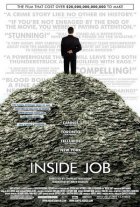
Inside Job Page #7
The title of the paper was, essentially: Is Financial Development Making the World
Riskier? And the conclusion was, uh, it is.
01:
40:55.15NARRATOR:
Rajan's paper focused on incentive structures that generated huge cashbonuses based on short-term profits, but which imposed no penalties for later losses.
Rajan argued that these incentives encouraged bankers to take risks that might
eventually destroy their own firms, or even the entire financial system.
01:
41:18.29RAGHURAM RAJAN:
It's very easy to generate performance by taking on more risk.And so what you need to do is compensate for risk-adjusted performance. And that's
where all the bodies are buried.
{KENNETH ROGOFF
PROFESSOR OF ECONOMICS, HARVARD}
01:
41:30.12KENNETH ROGOFF:
Rajan wa-, you know, hit the nail on the head. What heparticularly said was, you guys have claimed you have found a way to make more profits
with less risk. I say you've found a way to make more profits with more risk, and there's
a big difference.
01:
41:45.26RAGHURAM RAJAN:
Summers was, was vocal. He basically thought that I wascriticizing the change in the financial world, and was worried about, uh, you know,
regulation which would reverse this whole change. So essentially, he accused me of
Inside Job transcript – Sony Pictures – September 2010
32
being a Luddite. He wanted to make sure that we didn't bring in a whole new set of
regulations to constrain the financial sector at that point.
{LARRY SUMMERS DECLINED
TO BE INTERVIEWED FOR THIS FILM.}
01:
42:18.08FRANK PARTNOY:
You're gonna make an extra 2 million dollars a year — or 10 milliondollars a year — for putting your financial institution at risk. Someone else pays the bill,
you don't pay the bill. Would you make that bet?
Most people who worked on Wall Street said, sure, I'd make that bet.
01:
42:31.26{MUSIC CUE}
{THE HAMPTONS
01:
43:15.21ROBERT GNAIZDA:
It never was enough. They don't want to own one home; theywant to own five homes, and they want to have an expensive penthouse on Park
Avenue; and they want to have their own private jet.
01:
43:29.10CHARLES FERGUSON: You think this is an industry where high, very high
compensation levels are justified?
SCOTT TALBOTT:
Well I think I would, I would take caution, or take heed, or takeexception at your word very high. I mean, it's all relative.
01:
43:40.20REP. HENRY WAXMAN: You have a 14-million-dollar oceanfront home in Florida; you
have a summer vacation home in Sun Valley, Idaho; you and your wife have an art
collection filled with million-dollar paintings.
{RICHARD FULD
CEO, LEHMAN BROTHERS}
01:
43:50.11Inside Job transcript – Sony Pictures – September 2010
33
{LAWRENCE McDONALD
FORMER VICE PRESIDENT
LEHMAN BROTHERS}
LAWRENCE McDONALD: Richard Fuld never appeared on the trading floor. There
was art advisors up there all the time. You know, he had his own private elevator. The-,
the, he went out of his way to be disconnected.
I mean, his elevator – they hired technicians to program it, you know, so that his driver
would call in in the morning, and a security guard would hold it. And there's only like a
two- or three-second window where he actually has to see people. And he hops into this
elevator, and goes straight to 31.
01:
44:16.10CHARLES FERGUSON: Lehman owned a bunch of corporate jets. Do you know about
this?
{HARVEY MILLER
LEHMAN'S BANKRUPTCY LAWYER}
HARVEY MILLER:
Yes.CHARLES FERGUSON: How many were there?
HARVEY MILLER:
Well, there were six, including the 767s. They also had a helicopter.CHARLES FERGUSON: I see. Isn't that kind of a lot of planes to have, for –
01:
44:32.11{JEFFREY LANE
VICE CHAIRMAN:
LEHMAN BROTHERS (2003-2007)}
JEFFREY LANE:
You're dealing with Type A personalities, and uh, uh, Type Apersonalities know everything in the world.
WILLEM BUITER:
Banking became a pissing contest, you know; m-, mine's bigger thanyours; that kind of stuff. It was all men that ran it, incidentally.
JEFFREY LANE:
Fifty-billion-dollar deals were not large enough, so we do hundredbillion-dollar deals.
01:
44:48.07Inside Job transcript – Sony Pictures – September 2010
34
JONATHAN ALPERT:
These people are risk-takers; they're impulsive.{JONATHAN ALPERT IS A THERAPIST WHOSE CLIENTS
INCLUDE MANY HIGH-LEVEL WALL STREET EXECUTIVES.}
It's part of their behavior, it's part of their personality. And that manifests outside of work
as well.
It's quite typical for the guys to go out, to go to strip bars, to use drugs. I see a lot of
cocaine use, a lot of use of prostitution.
{–THE OWNER OF THE V.I.P. CLUB IN CHELSEA, WHO ESTIMATES
THAT ABOUT 80 PERCENT OF HIS CLIENTS ARE WALL STREET TYPES.}
01:
45:18.17{ANDREW LO
PROFESSOR & DIRECTOR
MIT LABORATORY FOR FINANCIAL ENGINEERING}
ANDREW LO:
Recently, neuroscientists have done experiments where, uh, they've, uh,taken individuals and put them into an MRI machine. And they have them play a game
where the prize is money. And they noticed that when these subjects earn money, the
part of the brain that gets stimulated is the same part that cocaine stimulates.
01:
45:38.24JONATHAN ALPERT:
A lot of people feel that they need to really participate in thatbehavior to make it, to get promoted, to get recognized.
NARRATOR:
According to a Bloomberg article, business entertainment represents 5percent of revenue for New York derivatives brokers, and often includes strip clubs,
prostitution, and drugs. A New York broker filed a lawsuit in 2007 against his firm,
alleging he was required to retain prostitutes to entertain traders.
01:
46:05.24JONATHAN ALPERT:
There's just a blatant disregard for the impact that their actionsmight have on, on society, on family. They have no problem using a prostitute, uh, and
going home to their wife.
01:
46:18.10 {MUSIC CUE}Inside Job transcript – Sony Pictures – September 2010
35
{KRISTIN DAVIS RAN AN ELITE PROSTITUTION RING
FROM HER HIGH-RISE APARTMENT.
IT WAS LOCATED A FEW BLOCKS FROM
01:
46:27.19CHARLES FERGUSON: How many customers?
KRISTIN DAVIS:
About 10,000 at that point in time.01:
46:36.01CHARLES FERGUSON: What fraction were from Wall Street?
KRISTIN DAVIS:
Of the higher-end clients, probably – 40 to 50 percent.CHARLES FERGUSON: And were all the major Wall Street firms represented?
Goldman Sachs.
KRISTIN DAVIS:
Lehman Brothers; yeah, they’re all in there.JONATHAN ALPERT:
Morgan Stanley was a little less of that. Uh, I think Goldmanwas, was pretty, pretty big with that.
01:
46:57.03KRISTIN DAVIS:
A lot of clients would call me, and say, can you get me a Lamborghinifor the night for the girl?
These guys were spending corporate money; I had many black cards from, you know,
the various financial firms.
JONATHAN ALPERT:
What's happening is services are being charged to computerrepair.
01:
47:14.19KRISTIN DAVIS:
Trading research; you know; consulting for market compliance. [They],I just usually gave them a piece of letterhead, and said, make your own invoice.
Translation
Translate and read this script in other languages:
Select another language:
- - Select -
- 简体中文 (Chinese - Simplified)
- 繁體中文 (Chinese - Traditional)
- Español (Spanish)
- Esperanto (Esperanto)
- 日本語 (Japanese)
- Português (Portuguese)
- Deutsch (German)
- العربية (Arabic)
- Français (French)
- Русский (Russian)
- ಕನ್ನಡ (Kannada)
- 한국어 (Korean)
- עברית (Hebrew)
- Gaeilge (Irish)
- Українська (Ukrainian)
- اردو (Urdu)
- Magyar (Hungarian)
- मानक हिन्दी (Hindi)
- Indonesia (Indonesian)
- Italiano (Italian)
- தமிழ் (Tamil)
- Türkçe (Turkish)
- తెలుగు (Telugu)
- ภาษาไทย (Thai)
- Tiếng Việt (Vietnamese)
- Čeština (Czech)
- Polski (Polish)
- Bahasa Indonesia (Indonesian)
- Românește (Romanian)
- Nederlands (Dutch)
- Ελληνικά (Greek)
- Latinum (Latin)
- Svenska (Swedish)
- Dansk (Danish)
- Suomi (Finnish)
- فارسی (Persian)
- ייִדיש (Yiddish)
- հայերեն (Armenian)
- Norsk (Norwegian)
- English (English)
Citation
Use the citation below to add this screenplay to your bibliography:
Style:MLAChicagoAPA
"Inside Job" Scripts.com. STANDS4 LLC, 2025. Web. 23 Feb. 2025. <https://www.scripts.com/script/inside_job_42>.







Discuss this script with the community:
Report Comment
We're doing our best to make sure our content is useful, accurate and safe.
If by any chance you spot an inappropriate comment while navigating through our website please use this form to let us know, and we'll take care of it shortly.
Attachment
You need to be logged in to favorite.
Log In